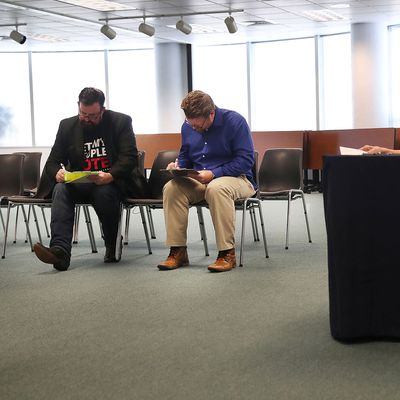
Earlier this week, Elizabeth Warren argued that the United States should abandon the Electoral College and elect its presidents by national popular vote instead.
South Carolina senator Lindsey Graham lambasted her proposal, arguing that it constituted nothing less than an attempt to make rural America “go away politically.” Many other conservatives echoed this charge.
Of course, abolishing the Electoral College would not actually disenfranchise rural-dwelling Americans. Establishing a national popular vote would (arguably) diminish the influence of such voters, since the Electoral College provides small rural states with a disproportionate share of electoral votes. But under such a system, rural Americans would still be overrepresented in the House and Senate — while their voters would be of equal value to all others in presidential contests. Thus, Graham’s ostensible position is that enacting any reform that leaves rural Americans with disproportionate influence over only one branch of the federal government — instead of all of them — is tantamount to targeted disenfranchisement, and an expression of the Democratic Party’s contempt for voters who disagree with their policies.
Meanwhile, in Florida:
Florida’s Republican-controlled Legislature is moving to roll back parts of a historic November constitutional amendment that reinstated voting rights for convicted felons, drawing sharp opposition from Democrats in a key 2020 presidential battleground … The House bill that advanced Tuesday defines what crimes would disqualify someone from being allowed to vote. It also requires ex-prisoners to pay any court costs, fines or fees before their sentence can be considered “complete” and their rights are restored.
The Florida GOP’s latest machinations are even more nefarious than this excerpt from Politico makes them sound.
For more than a century, Florida’s constitution forbade ex-felons from casting ballots. In recent decades, this provision has effectively disenfranchised hundreds of thousands of Floridians (were it not for the state’s felon-disenfranchisement law, Al Gore would almost certainly have prevailed in the 2000 election).
In 2007, then-governor Charlie Crist signed a law that allowed former felons to regain the franchise, so long as their re-enfranchisement was approved by the state’s Parole Commission. He assumed that this would lead to the automatic re-enfranchisement all ex-offenders, save for those convicted of murder or violent sexual crimes. And under his leadership, 150,000 ex-felons regained voting rights. But when Republican Rick Scott came to office in 2011, he all but froze the policy — in his eight years as governor, fewer than 3,000 formerly incarcerated Floridians regained the right to vote. Had Crist’s vision been fully implemented, more than 1 million additional Floridians would have been eligible to vote last November. Instead, on the day that Rick Scott won election to the Senate, and Republican Ron DeSantis won the governor’s mansion — both by razor-thin margins — roughly one-in-five African-American adults in Florida did not have the right to cast a ballot. (Extraordinarily, Marco Rubio and his Republican allies have subsequently claimed that Democrats tried to “steal” Florida’s elections, citing minor irregularities in Broward County’s election administration, while ignoring the fact that their own Senate candidate directly barred hundreds of thousands of people from voting).
Nevertheless, on that same Election Day, 65 percent of Florida voters approved an amendment restoring “the voting rights of Floridians with felony convictions after they complete all terms of their sentence including parole or probation.” Starting in January, former felons in the Sunshine State began registering to vote. Many cast ballots in local elections last month.
But now, Republicans in the Florida statehouse are pushing a bill that would throw some of these voters back off of the rolls. As noted above, the key provision in their legislation requires ex-convicts to pay off all court fees and fines before regaining the franchise. Republicans argue that ex-felons who have not repaid their literal debts have not completed “all terms of their sentence” — a deeply counterintuitive reading of the ballot measure’s wording. What’s more, the bill makes no exception for ex-felons who are gradually paying off their debts through court-approved payment plans. If an ex-felon has enough wealth or income to pay off their debts in one lump-sum payment, then she will have the right to vote in Florida. If she is poor — and thus, can only pay off her fines in monthly installments — she will not.
The term for a rule that restricts the franchise on the basis of a person’s financial means is “poll tax.”
As of this writing, Lindsey Graham has issued no statement condemning the House bill. Which is odd. After all, if Graham believes that it is wrong for Democrats to push election reforms that diminish rural Americans’ political influence — even when doing so merely leaves them with equal influence to other kinds of voters — how could he condone Republicans pushing laws that literally make Democratic-leaning voters “go away politically”? Otherwise, he would have to believe that “rural Americans” are entitled to disproportionate influence over every part of our government, but poor black people with criminal records are not even entitled to voting rights. And a high-ranking senator from one of our nation’s two (equally normal and legitimate) political parties couldn’t possibly believe something so forthrightly racist and anti-democratic, right?






























